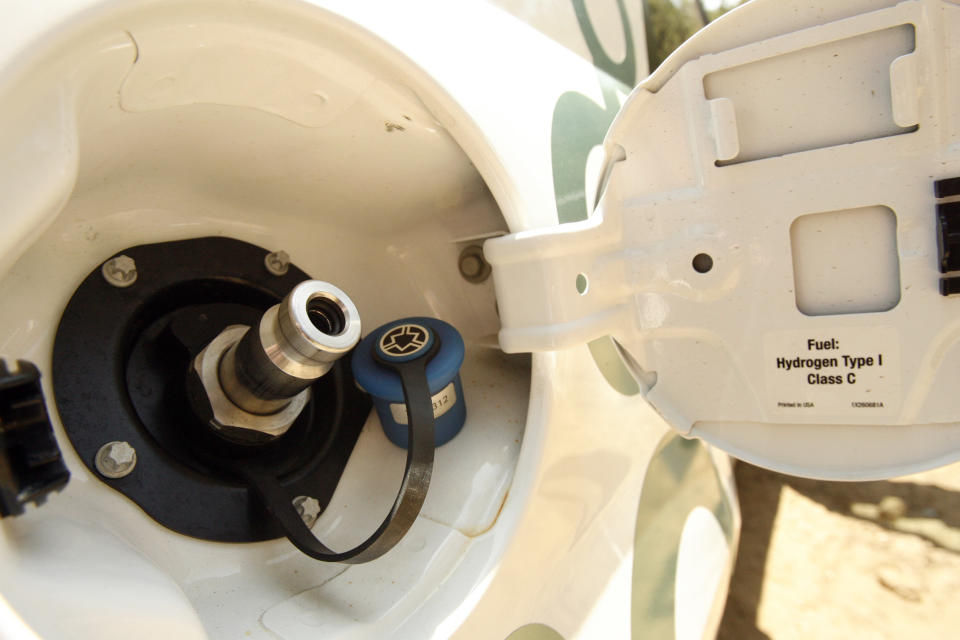Canada lags on hydrogen, Trudeau must pick clean tech winners: CEO
Prime Minister Justin Trudeau should place big bets on a handful of Canada’s strongest companies as his government prepares to spend billions on clean technology, according to the chief executive of Ballard Power Systems (BLDP.TO)(BLDP), a Vancouver-based fuel cell maker selling products around the world.
Randy MacEwen is encouraged by the Liberal government’s push for a green economic rebound from the COVID-19 pandemic, including the $10 billion in spending announced last week for renewable power, energy-efficient building retrofits, and zero-emissions buses. However, he says Canada is a laggard in adopting hydrogen technology and notes the risk of spreading new government funds too thinly.
“It’s easier to give a little bit to everyone,” MacEwen said in an interview. “A lot of people shrink from that type of challenge. What ends up happening is nobody gets enough. We should focus on a couple of key winners. Don’t be afraid to make big bets where we have real strength.”
The $10 billion will be spent over three years by the Canada Infrastructure Bank, a crown corporation that has faced criticism for struggling to deploy public money quickly.
Last Thursday’s announcement came on the heels of the government’s speech from the throne, which promised to make Canada a world leader in clean technology through an array of policy and spending intended to create a million jobs.
“We expect to see Ballard fuel cell buses driving on Canadian roads supported by this infrastructure and green initiatives plan,” MacEwen said.
While narrowing the focus of Ottawa’s spending may suit Ballard’s interests, Walid Hejazi, an associate professor of economic analysis and policy at the University of Toronto’s Rotman School of Management, warns against the strategy.
“Governments cannot pick winners, period,” he said in a phone interview, pointing to the recent scandal involving WE Charity’s handling of a $900-million student volunteer program.
“The question becomes, how was the decision made that a company or a small number of companies get the larger amounts? All of the evidence shows that governments get that wrong more often than they get it right.”
In addition to financial backing for Ballard, MacEwen wants to see Ottawa and other countries take a broader view of the cost of carbon.
“If I could wave a magic wand and have one policy request it would be to really recognize the cost of carbon. Have a global carbon tax that puts an appropriate cost on things like emissions, air quality issues, climate change, and health issues. That would really change the economics dramatically in favour of zero-emissions and low carbon solutions,” he said. “This is a market that Ballard leads in.”
Hydrogen and fuel cell tech have grabbed attention recently thanks in large part to Nikola (NKLA), the controversial Phoenix-based vehicle startup tied to General Motors (GM). At the same time, major oil companies including BP (BP) and Shell (RDS-B) are turning to hydrogen as they eye a greener future.
“There is a lot of investment going into the space,” MacEwen said, listing major manufacturers like Cummins (CMI) and Toyota (TM). “Look at the [government] support for hydrogen that the industry is seeing in Europe, South Korea, Japan, China, Saudi Arabia and Australia.”
Ballard makes fuel cell stacks and systems for a range of vehicles including transit buses, trucks, trains, ships and forklifts. Its biggest markets are in China, Europe and California. Last week, the company announced a collaboration with MAHLE, one of the world’s largest auto parts suppliers, to develop propulsion systems for trucks. The deal with the German automotive giant adds to Ballard’s growing global reach. At the company’s virtually-held investor day last week MacEwen told shareholders he sees a $130 billion total addressable market for hydrogen fuel cell engines.
While Ballard has thousands of fuel cell-powered buses and trucks in operation globally today, MacEwen said its presence on Canadian roads is currently “de minimis.” Even the 20 hydrogen-powered buses it deployed in its hometown for the 2010 Vancouver winter olympics have been replaced by diesel versions.
“We’re at ground zero in Canada in terms of market adoption,” MacEwen said.
Included in the $10 billion three-year Canada Infrastructure Bank plan revealed last week is a $1.5 billion provision to speed up adoption of zero-emissions buses and charging infrastructure.
MacEwen expects as early as 2023 the cost of ownership for fuel cell electric vehicles will be more compelling than fossil fuel alternatives. However, he admits hydrogen has seen its share of “false dawns” over the past quarter century, with automakers releasing only a small number of niche vehicles.
In the early 2000s, Toronto-listed shares briefly roared above $200 as investors predicted a hydrogen-powered future that has not yet materialized. While those hopes were dashed and the stock has retreated significantly from its highs, Ballard has been one of the best-performing companies on the Toronto Stock Exchange in recent years.
MacEwen is convinced that falling cost of ownership, coupled with greater support from governments, means this will not be another false start.
“In Canada, fuel cell electric buses make a lot of sense,” he said. “We think the opportunity for economic development is pretty compelling.”
Jeff Lagerquist is a senior reporter at Yahoo Finance Canada. Follow him on Twitter @jefflagerquist.
Download the Yahoo Finance app, available for Apple and Android.

 Yahoo Finance
Yahoo Finance 

